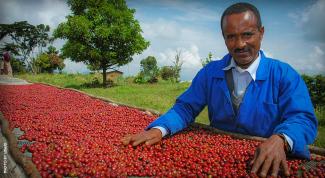BACKGROUND
Ethiopia realized substantial growth in its agriculture, industry and service sectors between 2003 and 2018. Nonetheless, limited private sector investment and a weak business enabling environment – exacerbated by conflict and a protracted drought – threaten those gains. In the latest World Bank Ease of Doing Business Index, Ethiopia ranked 175 out of 191. In 2019, Ethiopia embarked on an ambitious economic reform agenda by increasing the number, diversity, and market share of private businesses in the Ethiopian economy. The reform agenda addressed constraints such as unskilled labor, high transport costs, limited financial and telecommunications services, access to Forex, and land tenure insecurity. Despite good initial progress, the conflict in northern Ethiopia effectively stalled the reform agenda.
USAID commits to creating jobs and increasing access to healthy diets, to ensure that people can become more financially independent and provide a better standard of living for their families. We endorse private sector development within our core Feed the Future activities, and additional standalone activities aimed at enhancing policies, expanding access to finance, providing business development services, and improving working conditions. USAID promotes dialogue on binding economic constraints between these entities and the public institutions that govern them. USAID fosters private sector development by enabling a more stable and inclusive financial system that provides critical resources to developing businesses, particularly among underserved populations.
PRIORITIES
The CATALYZE: Market Systems for Growth activity fosters enterprise-driven growth, especially among Ethiopian private businesses that have high-growth potential. The project works with institutions, including The Agricultural Transformation institute, the Industrial parks Development Commission, Ethiopian Investment Commission, Jobs Creation Commission and associated Ministries, and private sector stakeholders, to build a stronger private sector in order to diminish government control of the economy and reduce the country’s dependence on donors.
In partnership with Harvard University’s Kennedy School of Business, our Advancing Economic Growth Diversification project, which ended in November 2022, engaged relevant institutions and the private sector to advance research and knowledge-sharing to develop a more effective policy framework and business-friendly environment to accelerate economic transformation. The output of this effort still guides donor and government efforts.
Feed the Future Ethiopia Transforming Agriculture works to make Ethiopia’s food and agriculture systems more competitive, inclusive, sustainable, and resilient in order to increase access to healthy diets, particularly for women and children. To do so, it will increase the availability, affordability (primarily by increasing incomes), convenience, and desirability of safe, diverse, nutritious foods, across the Feed the Future geographic zone of influence.
The Feed the Future Ethiopia Land Governance Activity works to improve governance and policy to enhance land tenure rights for farmers and pastoralists, empowering them to contribute more fully to their families’ and their communities’ economic growth prospects.
Feed the Future Policy LINK: Ethiopia Champions for Food Security works with institutions, civil society organizations, and the private sector to enhance leadership and management capacities, strengthen communication, coordination, and cooperation among institutions, and increase the power of local actors and communities. The efforts promote evidence-based analysis, participatory learning, and knowledge-sharing practices for effective and accelerated food and agriculture policy design and implementation.
The USAID Workers Wellness Alliance activity works with companies and workers at Ethiopia’s industrial parks to enhance the workplace environment and overall quality of life for employees, and contribute to workforce retention and productivity for businesses to increase their competitiveness in the exports.
The Agricultural Trade Accelerator activity will increase cross-border agricultural trade along the Ethio-Djibouti corridor by enhancing real-time visibility of conditions to alleviate congestion at major nodes, increasing capacity of sanitary/phytosanitary testing bodies, and increasing coordination between Ethiopian and Djiboutian authorities and the private sector. The activity will increase the speed and volume of agricultural trade as well as the number and diversity of private firms, including agricultural SMEs, utilizing the trade corridor.

